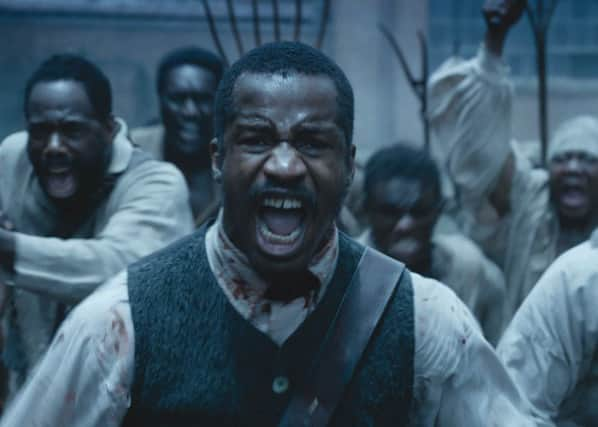Film reviews: The Birth of a Nation | Snowden | Life, Animated | Office Christmas Party


The Birth of a Nation (15) ***
Snowden (15) ***
Life, Animated (PG) ***
Office Christmas Party (15) **
Nate Parker’s slave drama The Birth of a Nation generated a slew of headlines at this year’s Sundance Film Festival when Fox Searchlight paid a record-breaking $17.5m for the distribution rights. By the time it was released in the US in September it was generating headlines of a different sort after Parker’s involvement in a rape case during college resurfaced (he was subsequently cleared of all charges), leading to calls for a boycott. In the process, the gun-jumping Oscar buzz – a lot of it speculatively based on the film’s status as a potential corrective to the Academy Awards’ ongoing diversity problems (it debuted in the midst of this year’s #OscarSoWhite outcry) – started to dissipate and the film tanked at the American box-office.
How much one has to do with the other is, of course, debatable and ultimately impossible to quantify; but watched purely as a film, what is clear is that The Birth of a Nation is not some singular artistic masterpiece. Prone to mythologising history with big hero moments, it’s reminiscent of dozens of other Oscar-baiting historical epics, from Braveheart (especially Braveheart) to this year’s Matthew McConaughey-starring Free State of Jones. In a way that’s also what’s subversive about it. In dramatising the life of Nat Turner, a Southern slave who led a violent and bloody rebellion against his white masters in 1831, Parker’s decision to use the tropes of the Hollywood historical epic is a political statement in itself, one made more pointed by the title’s bold repudiation of DW Griffith’s cinematically ground-breaking, horrifyingly racist 1915 epic of the same name.
Advertisement
Hide AdPlayed as an adult by Parker, Turner’s rise to prominence is thus presented very much in terms of manifest destiny and the hero myth, yet the film is at its most powerful when Parker’s revisionist approach highlights the perversities of a system that normalises a violently racist institution with a kindly smile and a few concessions to decency. Time and again we see the effect of that crushing, encoded prejudice etched on Parker’s face, particularly in his interactions with Turner’s superficially kindly master (played by Armie Hammer). When the violence that Nat witnesses become intolerable, however, his radicalisation – bolstered by his religious convictions – is presented in more simplistic revenge terms. That’s another trope of this type of filmmaking, but it’s problematic in this context because rape is used as the motivating factor and, rather than creating fully rounded female characters, the film presents the women as mere victims, their suffering designed to justify Turner’s transformation from helpless witness to avenging angel. Such clichéd filmmaking ends up robbing the finalé of much of its intended power. For all his good intentions, Parker’s revisionism has exposed the limits of the genre rather than his ability to subvert them.
It’s not hard to see why Oliver Stone was attracted to the story of NSA whistleblower Edward Snowden: both served their country in the military; both have been pilloried for exposing its flaws. The only consequences Stone has had to face, however, are some bad reviews from critics, which is hardly comparable to Snowden’s forced exile in Russia. Nevertheless, Stone’s obvious admiration shines through in Snowden, a rather hagiographic biopic that gets by thanks to Joseph Gordon-Levitt, uncanny performance in the title role.
The fundamental problem with the film is that the most exciting part has already been told in Citizenfour, Laura Poitras’s astonishing fly-on-the-wall account of how she and journalists Glenn Greenwald and Ewen MacAskill originally met with Snowden and broke the story about the American government’s mass surveillance programmes. Stone uses a dramatised version of this as a framing device, but as he jumps back and forth in time to present a more complete picture of the how Snowden got to this point, he doesn’t quite get under his skin. Still, in its own typically bombastic way, the film is not unentertaining.
“It was like we were looking for clues to a kidnapping,” says journalist Ron Suskind in Roger Ross Williams’ heartening documentary Life, Animated. He’s referring to his son, Owen, who after being diagnosed with autism at the aged of three, retreated into his own world – until his parents figured out that he was trying to use animated Disney films to process the complex emotions he was experiencing but was unable to properly express. Picking up the story as the now-27-year-old Owen is preparing to live on his own for the first time, the film offers a fascinating testament to the power and limitations of movies as tools for understanding and communicating with the world around us.
Although Office Christmas Party isn’t quite as horrendous as its self-explanatory title might suggest, this latest comedy vehicle for Jason Bateman and Jennifer Aniston –
their fifth together – could have
been a whole lot better. Bateman plays the overly cautious second-in-command of a struggling tech company whose man-child boss, played by TJ Miller, treats his employees like friends, much to the chagrin of his go-getting older sister (Aniston). She’s been acting CEO since the death of their father and is now threatening to close her brother’s division unless he can land a big client. With two days to go until Christmas, Hughes and a reluctant Bateman throw the mother of all office parties in a desperate bid to close a deal, at which point the film seems content to morph into an office-based (and less funny) riff on last Christmas’s superior Tina Fey/Amy Poehler hit Sisters.